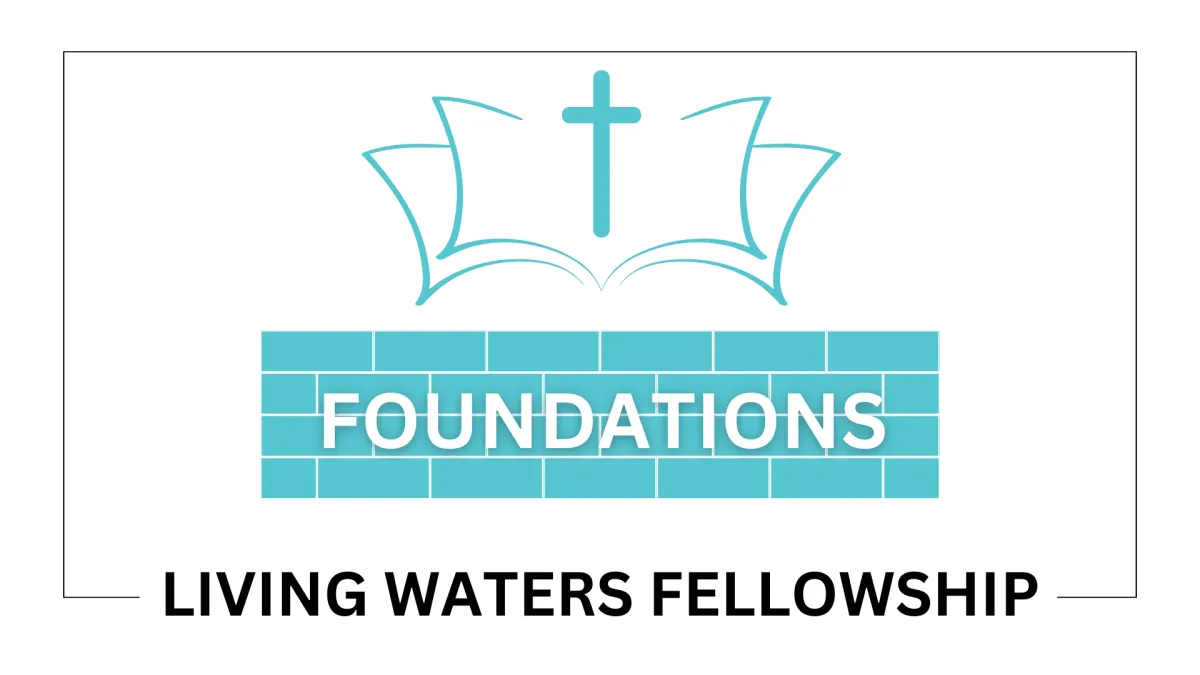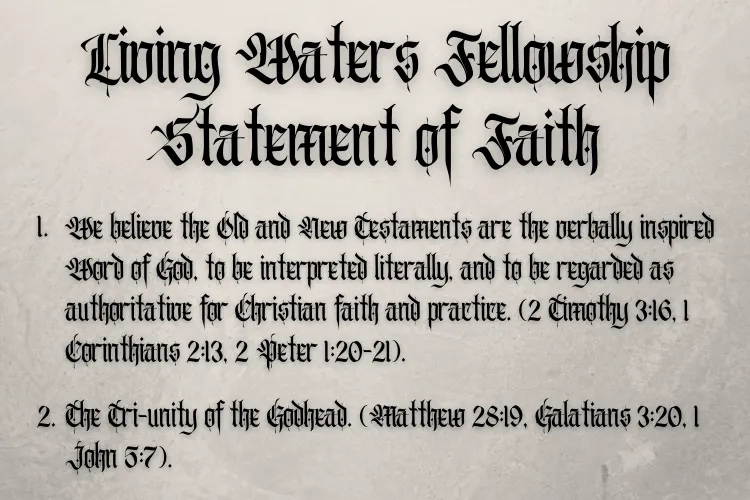I. Introduction to Christian Faith
i. Overview of the statement of faith
ii. What is biblical faith?
iii. The importance of faith in the Christian life
II. The Authority of the Bible
i. The inspiration and inerrancy of Scripture
ii. The role of the Bible in Christian faith and practice
iii. Principles of biblical interpretation
III. The Tri-unity of the Godhead
i. The nature of God as three-in-one
ii. The Father, Son, and Holy Spirit in Scripture
iii. Implications of the Trinity for faith and practice
IV. Creation, Fall, and Redemption
i. The biblical account of creation, fall, and redemption
ii. The sinfulness of humanity and our need for a savior
iii. The work of Christ on the cross and our salvation
V. The Person and Work of Jesus Christ
i. The deity and humanity of Christ
ii. The virgin birth and the life of Christ
iii. The death, burial, and resurrection of Christ
VI. The Gospel of the Grace of God
i. The message of the gospel
ii. The importance of the death, burial, and resurrection
iii. The implications of the gospel for our lives
VII. The Salvation of Sinners
VIII. The Second Coming of Christ
i. Christ's bodily ascension and heavenly enthronement
ii. The second coming and the resurrection of the dead
iii. The implications of the second coming of Christ
X. Pursuing Personal Holiness
i. The importance of personal holiness
ii. The role of discipline and self-control
iii. Sexual immorality and the honor of marriage
i. The nature of salvation
ii. The role of faith in salvation
iii. The assurance of salvation
VII. The Salvation of Sinners
i. The nature of salvation
ii. The role of faith in salvation
iii. The assurance of salvation
IX. Baptism and the Holy Spirit
i. The importance of water baptism by immersion
ii. The baptism of the Holy Spirit and tongues
iii. The gifts of the Spirit and their role in the church
XI. Divine Healing and the Lord's Supper
i. The nature of divine healing
ii. The prayer of faith
iii. The importance of the Lord's Supper for believers
XII. Eternal Life and Eternal Punishment
i. The reality of eternal life for believers
ii. The reality of eternal punishment for unbelievers
iii. The implications of eternal life and eternal punishment for Christian faith and practice




I. Introduction to Christian Faith

i. Overview of Our Statement of Faith
Living Waters Fellowship has a set of faith statements (Statement of Faith), that has been created to inform and reminds us of what it is we believe. These statements represents what we as a church or local fellowship believe to be the biblical truth as it pertains to the most fundamental teachings of scripture. (See Appendix I)
Living Waters Fellowship FCA Statement of Faith
We believe the Old and New Testaments are the verbally inspired Word of God, to be interpreted literally, and to be regarded as authoritative for Christian faith and practice. (2 Timothy 3:16, 1 Corinthians 2:13, 2 Peter 1:20-21).
The Tri-unity of the Godhead. (Matthew 28:19, Galatians 3:20, 1 John 5:7).
The Creation, the fall of man as recorded in Genesis 1, 2 and 3; Man’s inability to attain righteousness; Righteousness is found in the Lord Jesus Christ (1 Corinthians 5:21-22, Titus 3:5-6, Romans 3:23-24).
The Savior of men, the Lord Jesus Christ, conceived of the Holy Spirit, born of the Virgin Mary, Very God and very man (Luke 1:30-35, John 1:18, Isaiah 9:6).
The Gospel of the Grace of God, how Christ died for our sins, was buried, and rose again the third day for our justification (1 Corinthians 15:1-4, Romans 4:25).
The salvation of sinners by grace alone, through faith in the perfect and sufficient work of the cross of Calvary, by which secure remission of sins and eternal life (Ephasians 2:8-9, Hebrews 9:12-22, Romans 5:1).
The bodily ascension of Jesus into heaven. (Acts 1:9-11, Luke 24:50-51); His heavenly enthronement. (Hebrews 1:2-3, Ephesians 1:20); His personal appearing at His second coming. (Hebrews 9:28, 1 John 2:28); The Redeemed church shall be changed at this time. (Philippians 3:20-21); and a general resurrection of all the dead in Christ. (1 Thessalonians 4:15-17); all of which shall take place before the wrath of God. (1 Thessalonians 1:10, Romans 5:9).
The Water Baptism of believers by immersion. (Romans 6:3-4). In the name of the Father, the Son and the Holy Spirit by the command of Jesus. (Matthew 28:19).
The Baptism of the Holy Spirit as an experience subsequent to salvation, with the Scriptural evidence, namely, speaking with other tongues, as the Spirit gave them utterance. (Acts 2:1-4, 8:14-17, 10:44-47, Galatians 3:14-15).
The gifts of the Spirit as enumerated in 1 Corinthians chapters twelve to fourteen being exercised and practiced as manifested in the early church. (1 Corinthians 12-14).
We believe it is each believer’s duty to pursue personal holiness and develop spiritual maturity; to pursue a Spirit-filled life and grow in grace; to practice discipline and self-control; to avoid sexual immorality and honor the Work of God which sets forth marriage as a life-long convenient between one man and one woman, and the legitimate context for sexual relations. ( 2 Corinthians 7:1, 1 Thessalonians 4:3-4, Matthew 19:4-6, Hebrews 13:4).
The healing of the body by Divine power, or Divine healing in its many aspects as practiced by the early church. (Acts 4:30, 1 Corinthians 12:9, James 5:14, Matthew 8:17, Mark 16:18).
The Lord’s Memorial, commonly call Supper, for believers. (1 Corinthians 11:23-32).
The eternal life of the believer (John 10:28) and the eternal punishment of the unbeliever (Mark 9:43-48, 2 Thessalonians 1:9, Revelation 20:10-15).
The reality and personality of Satan (Job 1:7, 2 Corinthians 11:14).
The sovereign government of the local church. The fellowship of believers which constitute a local church (Hebrews 10:25, 1 John 1:7, Ephesians 4:2-3, 1 Thessalonians 2:14, 1 Corinthians 16:17).
This brief course will explore the foundational beliefs and practices of the Christian faith based as outlined in Living Water's statement of faith outlined in Appendix I. It will examine the authority of the Bible, the nature of God, the salvation of sinners, the person and work of Jesus Christ, and the role of the church in the world. The course will also explore practical implications of these beliefs for personal holiness and spiritual growth.
It will be clear as we progress through the course that our statement of faith has been adopted, not created. That is, it is based entirely and solely on our faith in the Bible and from the instruction it give to us.

ii. What is biblical faith?
Faith is a central concept in the Bible, and it is essential for Christians to understand what it means and how it is demonstrated in the lives of believers. Biblically speaking, faith is defined as a confident trust in God and His promises, based on the conviction that God is both trustworthy and able to keep His promises.
The author of Hebrews provides an excellent definition of faith in Hebrews 11:1, which states, "Now faith is the assurance of things hoped for, the conviction of things not seen." This definition highlights two essential aspects of faith: assurance and conviction. Faith involves being sure of the things we hope for, even if we cannot see them yet, and having a deep conviction that these things are true and trustworthy.
Faith is also demonstrated in action. James 2:14-26 emphasizes the importance of faith being accompanied by deeds: "What good is it, my brothers and sisters, if someone claims to have faith but has no deeds? Can such faith save them?...faith by itself, if it is not accompanied by action, is dead" (James 2:14, 17). This passage stresses that true faith produces good works and deeds that are consistent with the belief in God.
Furthermore, the Bible shows that faith is a gift from God, and it cannot be earned through our own efforts. Ephesians 2:8-9 says, "For it is by grace you have been saved, through faith—and this is not from yourselves, it is the gift of God—not by works, so that no one can boast." This passage affirms that faith is a gift from God and is not something that we can earn or achieve by our own merit.

iii. The importance of faith in the Christian life
The life of a Christian is a life of faith. Our new life begins with an act of faith. Our daily walk with Christ is a walk of faith. Every step of obedience is a step of faith. So central is faith to our lives that we are told in Hebrews 11:16 that we cannot even please God or receive anything from him. Faith in God and his word is the very essence of Christianity.
Faith is essential for salvation: As mentioned above, it is through faith that we are saved (Romans 3:22, 28). Without faith, it is impossible to please God (Hebrews 11:6). This is because faith is the means by which we receive the grace of God, which is the basis for our salvation.
Faith produces obedience: True faith is not just an intellectual belief, but a heart-felt trust in God that results in obedience to His commands (James 2:14-26). Faith without works is dead, and genuine faith will always produce good works.
Faith overcomes fear: When we face difficult circumstances or challenges in life, faith gives us the courage and strength to overcome them. As we trust in God, we can have peace in the midst of trials and tribulations (John 16:33).
Faith enables us to receive God's promises: Throughout the Bible, we see that those who had faith in God received His promises. From Abraham and Sarah to Moses and Joshua, those who trusted in God saw His faithfulness in their lives. The same is true for us today as we trust in God's promises (Hebrews 11).
Faith brings us into a relationship with God: The ultimate purpose of faith is to bring us into a personal relationship with God. As we trust in Jesus Christ for salvation, we are reconciled to God and become His children (John 1:12). Through faith, we can know God and experience His love, grace, and power in our lives.